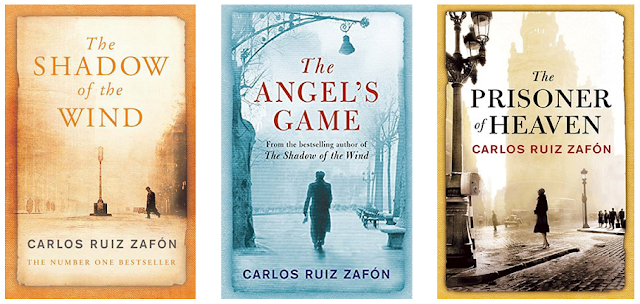by Carols Ruiz Zafón
★★★★
This is the 4th and final book in the Cemetery of
Forgotten Books series.
To begin, The Shadow of the Wind will always be one of my
favorite books. It is the first book in this series and a classic gothic novel.
At this point, I've fallen so in love with Zafón's characters and his rich
descriptions of Barcelona, that I have a hard time being objective about his
work. I am more forgiving when there are plot hiccups because I'm already
invested in the world he created. That being said let me dive into this latest
installment.
The Labyrinth of Spirits picks up shortly after The
Prisoner of Heaven ends. Our main protagonist is the troubled Alicia Gris.
She's a bit of a femme fatale with her own troubled past and wounds, both
physical and mental. The book pulls you in immediately with a scene from
Fermin's past, but then we move forward in time and the middle has some pacing
issues.
The plot is so convoluted with extra characters and
layers upon layers of history that at times it’s hard to follow. I didn’t
barrel through it as quickly as The Prisoner of Heaven or savor the atmosphere
like The Shadow of the Wind. Instead I found that I enjoyed it most when I
could sit and give it my full attention for a large chunk of time. Clocking in
at over 800 pages (at least in ARC form), you need to sink into this world to
juggle the different characters. Once you do, you are rewarded with slow but
sure development. Obviously my favorite moments are when we return to the
Sempere family. Once Alicia's path crossed with theirs I felt more connected.
***After this point my review assumes you’ve already read
the whole series, but there are no spoilers for this book***
There's a moment in the book when Zafón actually explains
the arch of the series. It's just perfect and gives an insider's wink to anyone
who has read all four books. About The Labyrinth of Spirits he says,
“The fourth
installment, fierce and enormous, spiced with perfumes from all the earlier
ones, would lead us at last to the center of the mystery, uncovering all the
puzzles with the help of my favorite fallen angel of mist, Alicia Gris.”
It's a perfect summary. Despite the author's sometimes
loquacious tendencies and a pile of characters that it's easy to confuse (Gris'
detective partner Vargas, her mentor Leandro, Inspector Fumero's apprentice
Hendaya, the banker Sanchís and his wife Victoria Ubach, the author Víctor
Mataix and his daughter Ariadna, the fumbling stalker Rovira, the journalist
Vilajuana, the missing political minister Mauricio Valls, the besotted
Fernandito, Daniel's cousin Sofía, and on and on...), the book is still a
delight. It's a bit of work, but it's worth it in the end because it ties the
whole world together.
I'm so glad we get to know Isabella Sempere's character a
little better. Often when we lose a parent at a young age, it's easy to turn
them into an idealized saint. Seeing the real person, full of flaws and bad
decisions, can be painful, but it's so much more real. We finally have a chance
to meet her, full of fire and grit, and hear her story in her own voice. It’s
always been a flaw out Zafón’s to paint women as either whores or saints
instead of giving them depth. I felt like this book gave us a few that were
more developed, although it's certainly still focused more on the men. I wish
we'd had a chance to explore the world through Bea's eyes, but we never get
that privilege. Instead, the story comes full circle with Daniel and Bea's son
Julián. We also spend more time with Fermin, who I've grown to love in all his
irreverent glory.
BOTTOM LINE: Heartbreaking and beautiful, the story
brings all of his characters together, somehow turning all four books into one
complete tale. It's a must for anyone who loves the series. If you're new to
his work I’d recommend try The Shadow of the Wind first to see if it's for you.
“At the time I was just a kid and life was still a few
sizes too big for me.”
“However many sorrows you drag along with you, you’ll
only have walked a few steps before bumping into someone who will remind you
that there’s always another person with a far worse set of cards then yours in
the game of life.”
“Some would argue that no genre is more fictitious than a
biography.”
“With the possible exception of an autobiography,” Mataix
granted.
“Learning how to differentiate between why one does
things and why one says one does them is the first step toward getting to know
oneself.”
“The most sincere pain is experienced alone.”







